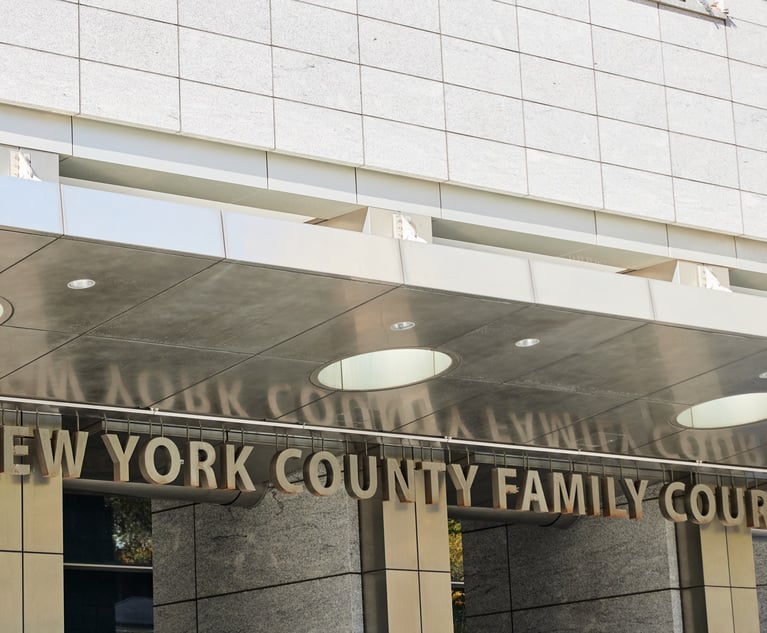 Alton L. Abramowitz
Alton L. Abramowitz COVID-19: Protecting Children of Divorce in a Time of Pandemic Surges
In this edition of his Divorce Law column, Alton L. Abramowitz discusses a few decisions that represent the proverbial "tip of the iceberg" with respect to the protection of children at a time imbued with periodic surges of COVID-19 and its multiple variants. They provide us with proof positive of the basic premise that courts are still concerning themselves with the centuries' old standard of determining what is in "the best interests of children," inclusive of vaccination requirements.
February 08, 2022 at 12:00 PM
9 minute read
Serious times involving serious health risks bring about serious issues when children of a marriage are perceived by the courts to be endangered by the attitudes of a parent that oftentimes defy common sense, empirical data and the recommendations of governmental agencies invested with the obligation of informing and protecting the public at large. A headline in the Los Angeles Times of Jan. 18, 2022, blares out a warning in question form: Coronavirus Today: No vaccine, no custody? That newspaper's science and medicine editor, Karen Kaplan, concentrated her article, in part, on published court decisions throughout our country which have focused on the risks to children where one parent refuses to become vaccinated against COVID-19 and the other parent is vaccinated, as well as on questions of whether one parent may cause a child to be vaccinated over the objections of the other parent. See also Catherine E. Shoichet, How COVID is making divorce cases more complicated, CNN (Jan. 30, 2022).
Two of the more prolific authors of judicial opinions in the divorce and family law fields, then Justice Richard A. Dollinger of Monroe County Supreme Court and then Justice Matthew F. Cooper of New York County Supreme Court not surprisingly issued opinions involving this controversial topic. In early October 2021, Justice Cooper wrote about whether the de facto custodial parent, the mother, could condition the father's already limited and supervised access time with their three-year-old child by insisting that he and the supervisor be vaccinated or that they submit to testing prior to each access period. His opening paragraph signals the direction in which his decision was headed: "Throughout most of modern medical history, the advent of a vaccine was almost universally embraced as a means of protecting ourselves and our children from deadly or debilitating disease …., most people, heeding expert medical opinion, have availed themselves of vaccines that promise not only to protect them and others from the ravages of COVID-19, but ultimately to completely vanquish the virus. Unfortunately, and to my mind, incomprehensibly, a sizeable minority, seizing upon misinformation, conspiracy theories, and muddled notions of 'individual liberty,' have refused all entreaties to be vaccinated." Justice Cooper then goes on to require, in the child's "best interests," that the father and anyone supervising his access be vaccinated or undergo regular testing. In reaching this conclusion, the Justice opines: "In the final analysis, the fundamental question in this dispute between the child's two parents is this: What matters more to each of them, his or her own interests or those of their child? On one hand, there is the defendant father, who is unable to offer any reasonable, let alone compelling, reason why he should not be vaccinated or even undergo testing, resisting … both simply because he sees it as his 'right' to do so. On the other hand, there is the plaintiff mother, who is fully vaccinated and observant of COVID-19 protocols, seeking the imposition of reasonable conditions on defendant's access not because it somehow benefits her, but because it serves to protect the health, safety, and well-being of the child." C.B. v. D.B., 73 Misc.3d 702 (Sup. Ct. N.Y. County 2021).
This content has been archived. It is available through our partners, LexisNexis® and Bloomberg Law.
To view this content, please continue to their sites.
Not a Lexis Subscriber?
Subscribe Now
Not a Bloomberg Law Subscriber?
Subscribe Now
NOT FOR REPRINT
© 2025 ALM Global, LLC, All Rights Reserved. Request academic re-use from www.copyright.com. All other uses, submit a request to [email protected]. For more information visit Asset & Logo Licensing.
You Might Like
View All
Family Law Practitioners Weigh In on Court System's New Joint Divorce Program

'Intrusive' Parental Supervision Orders Are Illegal, NY Appeals Court Says
4 minute read
'Landmark' New York Commission Set to Study Overburdened, Under-Resourced Family Courts

Law Journal Column on Marital Residence Sales in Pending Divorces Puts 'Misplaced' Reliance on Two Cases
8 minute readTrending Stories
- 1States Accuse Trump of Thwarting Court's Funding Restoration Order
- 2Microsoft Becomes Latest Tech Company to Face Claims of Stealing Marketing Commissions From Influencers
- 3Coral Gables Attorney Busted for Stalking Lawyer
- 4Trump's DOJ Delays Releasing Jan. 6 FBI Agents List Under Consent Order
- 5Securities Report Says That 2024 Settlements Passed a Total of $5.2B
Who Got The Work
J. Brugh Lower of Gibbons has entered an appearance for industrial equipment supplier Devco Corporation in a pending trademark infringement lawsuit. The suit, accusing the defendant of selling knock-off Graco products, was filed Dec. 18 in New Jersey District Court by Rivkin Radler on behalf of Graco Inc. and Graco Minnesota. The case, assigned to U.S. District Judge Zahid N. Quraishi, is 3:24-cv-11294, Graco Inc. et al v. Devco Corporation.
Who Got The Work
Rebecca Maller-Stein and Kent A. Yalowitz of Arnold & Porter Kaye Scholer have entered their appearances for Hanaco Venture Capital and its executives, Lior Prosor and David Frankel, in a pending securities lawsuit. The action, filed on Dec. 24 in New York Southern District Court by Zell, Aron & Co. on behalf of Goldeneye Advisors, accuses the defendants of negligently and fraudulently managing the plaintiff's $1 million investment. The case, assigned to U.S. District Judge Vernon S. Broderick, is 1:24-cv-09918, Goldeneye Advisors, LLC v. Hanaco Venture Capital, Ltd. et al.
Who Got The Work
Attorneys from A&O Shearman has stepped in as defense counsel for Toronto-Dominion Bank and other defendants in a pending securities class action. The suit, filed Dec. 11 in New York Southern District Court by Bleichmar Fonti & Auld, accuses the defendants of concealing the bank's 'pervasive' deficiencies in regards to its compliance with the Bank Secrecy Act and the quality of its anti-money laundering controls. The case, assigned to U.S. District Judge Arun Subramanian, is 1:24-cv-09445, Gonzalez v. The Toronto-Dominion Bank et al.
Who Got The Work
Crown Castle International, a Pennsylvania company providing shared communications infrastructure, has turned to Luke D. Wolf of Gordon Rees Scully Mansukhani to fend off a pending breach-of-contract lawsuit. The court action, filed Nov. 25 in Michigan Eastern District Court by Hooper Hathaway PC on behalf of The Town Residences LLC, accuses Crown Castle of failing to transfer approximately $30,000 in utility payments from T-Mobile in breach of a roof-top lease and assignment agreement. The case, assigned to U.S. District Judge Susan K. Declercq, is 2:24-cv-13131, The Town Residences LLC v. T-Mobile US, Inc. et al.
Who Got The Work
Wilfred P. Coronato and Daniel M. Schwartz of McCarter & English have stepped in as defense counsel to Electrolux Home Products Inc. in a pending product liability lawsuit. The court action, filed Nov. 26 in New York Eastern District Court by Poulos Lopiccolo PC and Nagel Rice LLP on behalf of David Stern, alleges that the defendant's refrigerators’ drawers and shelving repeatedly break and fall apart within months after purchase. The case, assigned to U.S. District Judge Joan M. Azrack, is 2:24-cv-08204, Stern v. Electrolux Home Products, Inc.
Featured Firms
Law Offices of Gary Martin Hays & Associates, P.C.
(470) 294-1674
Law Offices of Mark E. Salomone
(857) 444-6468
Smith & Hassler
(713) 739-1250






